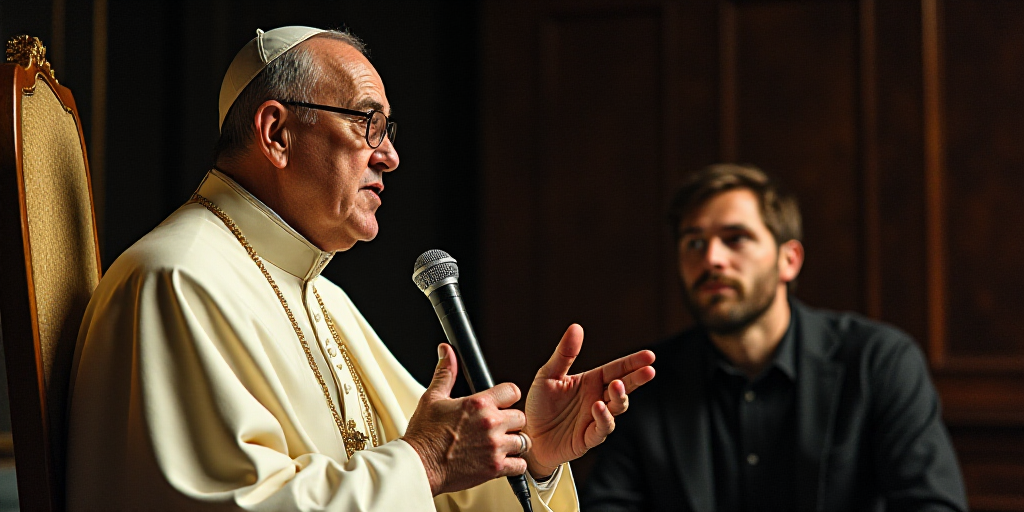Introduction to Pope Francis’ Environmental Advocacy
Pope Francis has been a prominent figure in discussions about environmental destruction, notably through his second encyclical, “Laudato Si’,” published in May 2015. This document focused on the care of our natural environment and all people, serving as a guiding principle for the Pontiff throughout his papacy.
Key Environmental Issues Addressed in “Laudato Si'”
“Laudato Si'” tackled various contemporary environmental problems, including pollution, climate change, water scarcity, loss of biodiversity, and global inequality. The encyclical also explored social trends and ideologies contributing to these environmental issues, such as the unchecked use of technology, human domination over nature, narrow economic theories, and moral relativism.
Proposed Solutions
Pope Francis proposed solutions involving policymakers, scientists, communities, and society at large. He emphasized the integration of social justice and ecological concerns, urging a holistic approach to address environmental challenges.
Expert Opinions on Pope Francis’ Environmental Message
Sergio Cobo, a Jesuit missionary in Mexico’s Sierra Norte de Veracruz, shared with El Economista that the Pope effectively linked “social sin” and “ecological sin against the Earth,” highlighting the destructive relationship between humanity and nature.
According to Cobo, a group of UNAM researchers, including José Sarukhán, stated that “Laudato Si'” not only kept pace with scientific advancements but also anticipated them. The encyclical integrated social and ecological sins, emphasizing the need to incorporate ethical considerations into scientific discoveries.
Pope Francis’ Stance on Environmental Destruction as an Offense to God
Pope Francis repeatedly asserted that environmental destruction is an offense to God. He described it as both a personal and structural sin, endangering all humanity—especially the most vulnerable—and threatening intergenerational conflict. His proposals were grounded in Catholic doctrine and scientific data, advocating for the care of “our common home.”
Support for Vulnerable Populations
The Pope emphasized that the poorest populations, who contribute minimally to pollution, require more support and protection. He called for ensuring a future for young people and children, warning that unaddressed environmental issues pose existential threats to humanity, other living beings, and ecosystems.
Distribution of Emissions Responsibility
Pope Francis highlighted the disparity in greenhouse gas emissions, noting that wealthy nations, comprising over a billion people, produce more than half of the heat-trapping pollutants. Meanwhile, the poorest three billion contribute less than 10%, yet bear 75% of the resulting losses. Developing countries, mostly African nations, account for only 1.1% of global CO2 emissions, while G20 nations are responsible for 80%.
Holistic Approach to Environmental Challenges
The Pope advocated for a harmonious and symphonic approach to environmental conservation, safeguarding natural resources like the Amazon and Congo basins, peatlands, mangroves, oceans, coral reefs, agricultural lands, and polar regions. This integrated strategy combats climate change while addressing biodiversity loss and inequality.
Science and Faith: Complementary Paths
Pope Francis, a former chemistry professional, frequently supported his arguments with scientific knowledge. He believed in science’s transformative power and its role in serving humanity, not destroying it. He acknowledged science’s relevance in combating climate change and urged scientists to collaborate on global problem-solving.
Science and Faith Sharing a Common Truth
The Pope often stated that science and faith are distinct yet parallel paths sharing the same absolute truth of God. He urged scientists to remember their role in society, serving humanity and promoting integral human development rather than remaining isolated.
Science, Plurality of Knowledge, and Peacebuilding
Pope Francis emphasized the importance of diverse scientific knowledge in building peace. He discouraged any single scientific discipline from walking alone and stressed the need for various specialized knowledge to foster a new culture promoting human dignity and development.
Pope’s Reflections on Artificial Intelligence
In 2024, though unable to meet with the Pontifical Academy of Sciences, Pope Francis expressed concerns about artificial intelligence’s potential risks. He called for recognizing and preventing manipulative uses of AI to shape public opinion, influence consumer decisions, and interfere in elections.
Pope Francis’ Vision for Science
- Science as a Service to Humanity: Pope Francis has stressed that science should serve humanity, not destroy it. Science must promote human dignity, peace, and well-being.
- Science as a Tool for Peace: The Pope has acknowledged science’s potential to build peace, highlighting the importance of collaboration among scientists from different countries.
- Science and Faith: Pope Francis has affirmed that there is no conflict between faith and science; both can coexist and complement each other. Science can deepen our understanding of nature and creation, while faith can provide meaning to life.
- Science and Ethics: The Pope has urged scientists to consider the ethical implications of their research, ensuring responsible and beneficial use of science for the common good.
- Science and Environment: Pope Francis has recognized the importance of science in combating climate change and has called on scientists to work towards solutions for environmental challenges.






